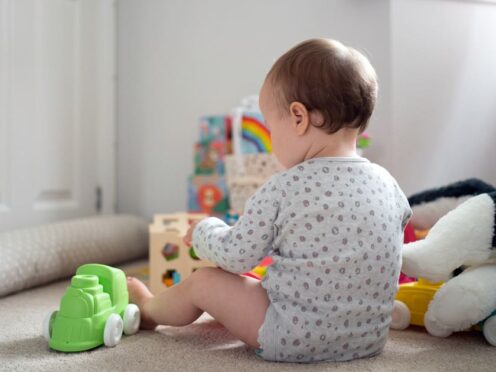
Parents are frequently given “outdated” advice on how to raise their children, a new poll suggests.
This includes being told to “limit physical affection” to being told off for “spoiling” their baby with praise or attention.
When asked what old-fashioned advice they had received when their babies were young, some 55% of parents said they were told not to pick up their baby when crying.
Just over half (53%) of 2,000 English parents with children under the age of two were told to ignore emotional needs of their child to help “build up resilience”.
And the same number were told that “it’s best to let baby cry it out”.
The subject remains a hot topic of contention among parents – when asked whether they agreed or disagreed that letting a baby ‘cry it out’ will help babies learn to self soothe/settle, some 41% of parents said they agree and 39% said that they disagree.
The survey, conducted by Censuswide, was released to mark the launch of the Government’s new Start for Life Campaign: If They Could Tell You.
Almost three quarters (73%) said that they would find it helpful to receive clearer guidance and support in nurturing their connection/bonding with their baby.
The Department of Health and Social care said it wanted to highlight how a baby’s mental health affects their development after 41% of parents surveyed were “unaware that mental health starts to impact a child’s development before they are two”.
Health minister Dame Andrea Leadsom said: “We are committed to giving every baby the best start in life, and promoting that vital secure attachment between babies and their parents in the 1,001 critical days from pregnancy to two years old is crucial for their future wellbeing.
“Parents can access a range of support and advice, in person via family hubs and on the Start for Life website.
“We are also launching new guidance for frontline practitioners, aimed at helping them to start conversations with parents about building their relationship with their baby.”

The new guidance offers frontline workers guidance on how to explore a parent and baby relationship.
The document, for health visitors, midwives, nursing associates, family support workers and social workers, also sets out the steps workers can take to support parents who are struggling to connect with their baby.
Parents surveyed ahead of the launch of the campaign were also asked about the biggest barriers to bonding and connecting with their child.
Some 49% said ‘work commitments/not enough time’, 29% said they were also looking after other children and 28% cited concerns around financial pressures.
Dr Jeanelle de Gruchy, deputy chief medical officer for England, said: “A strong, loving connection between parents or carers and their baby can play a significant role in developing the brain and protecting their mental health as they grow up.
“This campaign will make it easier for parents and carers to interpret the way their baby is communicating with them and understand how best to meet their baby’s needs.
“Raising a baby is not easy and I hope that new NHS trusted advice provided through the campaign will be a helpful source of information and support to parents and carers.
“New guidance for frontline practitioners will also help start conversations with parents and carers to explore their relationship with their baby, in order to provide support.”

Enjoy the convenience of having The Sunday Post delivered as a digital ePaper straight to your smartphone, tablet or computer.
Subscribe for only £5.49 a month and enjoy all the benefits of the printed paper as a digital replica.
Subscribe